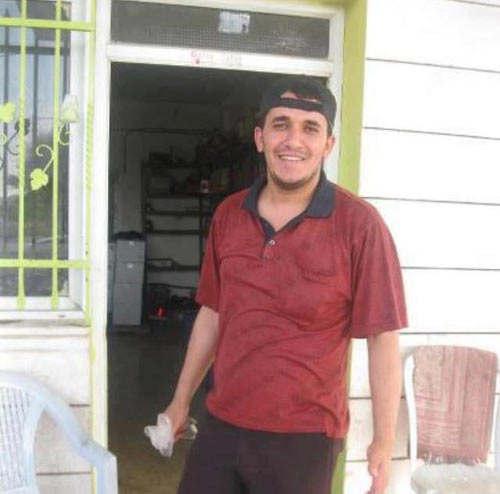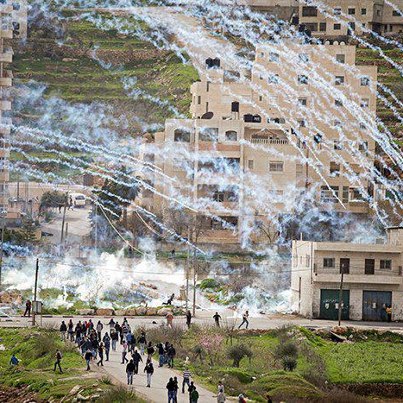Jordanian activist Khalid al-Natour has been held incommunicado in Saudi Arabia since January 6, when he arrived on a work visa with colleagues. His friends and family have not been informed of any reason for his detention and he has been unable to contact the outside world. Please call the Saudi embassy in your country – in Washington, DC the number is 202-342-3800 and in Ottawa, the number is 613-237-4100. Please inform the Saudi embassy that people around the world are deeply concerned about Khalid al-Natour.
Amnesty International issued the following statement:
DOCUMENT – SAUDI ARABIA: JORDANIAN HELD INCOMMUNICADO IN SAUDI ARABIA
UA: 52/13 Index: MDE 23/007/2013 Saudi Arabia Date: 26 February 2013
 URGENT ACTION
URGENT ACTION
A Jordanian man has been held incommunicado in an undisclosed location in Saudi Arabia since 6 January. He was last seen being arrested by Saudi Arabian security forces, and has since been denied access to his family and to the outside would. The conditions of his detention may amount to enforced disappearance if the Saudi Arabian authorities continue to refuse disclosing his fate.
Jordanian web developer Khalid al-Natour, 27 years old, was arrested upon arrival at the King Khalid International Airport in Riyadh, the capital of Saudi Arabia, on 6 January 2013. He had arrived from Jordan with four of his colleagues on a business trip (all five men work for the same internet holding company). Khalid al-Natour was detained by the Saudi Arabian authorities; his colleagues were told they would risk a similar fate if they did not leave the airport immediately.
Khalid al-Natour is a member of Herak, a Jordanian pro-reform movement that has called for political and economic change in Jordan as well as increased political freedoms. In September 2011, he was arrested near the Saudi Arabian consulate in ‘Amman, Jordan, for insulting a Jordanian security officer during a demonstration protesting against Saudi Arabia’s involvement in Bahrain. He was subsequently released on bail a day later; his case remains pending before a Jordanian court.
On 23 December 2012, he was granted a single-entry visa to Saudi Arabia while his four colleagues were granted multiple-entry visas by the Saudi Arabian embassy in Jordan. Neither the Jordanian authorities nor Khalid al-Natour’s family, who have sought information about his case, have been provided with an official response regarding his detention, including his whereabouts and the reason for his detention.
Please write immediately in Arabic, English or your own language:
Calling on the Saudi Arabian authorities to immediately disclose Khalid al-Natour’s whereabouts;
Urging them to ensure that he is protected from torture or other ill-treatment and given, without delay, regular access to his family, lawyers of his own choosing, consular assistance and any adequate medical treatment he may require;
Urging them to release Khalid al-Natour unless he is promptly charged with an internationally recognizable criminal offence and tried in proceedings that conform fully to international fair trial standards.
PLEASE SEND APPEALS BEFORE 9 APRIL 2013 TO:
�
Minister of the Interior
His Royal Highness Prince Mohammed bin Naif bin Abdul Aziz Al Saud
Ministry of the Interior, P.O. Box 2933, Airport Road, Riyadh 11134
Kingdom of Saudi Arabia
Fax: +966 1 403 3125 (please keep trying)
Salutation: Your Royal Highness
King and Prime Minister
King Abdullah bin Abdul Aziz Al Saud
The Custodian of the two Holy Mosques
Office of His Majesty the King
Royal Court, Riyadh
Kingdom of Saudi Arabia
Fax: (via Ministry of the Interior)
+966 1 403 3125 (please keep trying)
Salutation: Your Majesty
And copies to:
Minister of Foreign Affairs
His Excellency Nasser Judeh
Ministry of Foreign Affairs
P.O. Box 35217
Amman, Hashemite Kingdom of Jordan
Fax: +962 6 573 5163
Email: mofa@fm.gov.jo�
Also send copies to diplomatic representatives accredited to your country.
Please check with your section office if sending appeals after the above date.
�
URGENT ACTION
jordanian held incommunicado in saudi arabia
ADDITIONAL INFORMATION
Critics of the Saudi Arabian government face gross human rights violations. They are often held incommunicado without charge, sometimes in solitary confinement, and denied access to lawyers or the courts to challenge the lawfulness of their detention. Torture or other ill-treatment is frequently used to extract “confessions” from detainees, to punish them for refusing to “repent”, or to force them to sign pledges promising not to criticize the government. Incommunicado detention in Saudi Arabia often lasts until a “confession” is obtained, which can take months and occasionally years.
Saudi Arabia has systematically violated international human rights standards that irrevocably prohibit prolonged incommunicado detention of detainees. The UN General Assembly has stated that “prolonged incommunicado detention or detention in secret places can facilitate the perpetration of torture and other cruel, inhuman or degrading treatment or punishment and can in itself constitute a form of such treatment” (UN General Assembly resolutions 62/148 paragraph 15, and 63/166 paragraph 20, 17 December 2007 and 12 December 2008 respectively). Similarly, the UN Human Rights Committee has stated that provisions should be made against incommunicado detention (General Comment 20, Article 7, forty-fourth session, 1992), and the UN Committee against Torture has consistently called for its elimination. The UN Special Rapporteur on torture and other cruel, inhuman or degrading treatment or punishment, recognizing that “torture is most frequently practised during incommunicado detention”, has also called for such detention to be made illegal.
Amnesty International has detailed such abuses as well as the crackdown on freedom of expression and protests in the name of security in a report entitled Saudi Arabia: Repression in the name of security (MDE 23/016/2011), issued on 1 December 2011 (http://www.amnesty.org/en/library/info/MDE23/016/2011/en).
Name: Khalid al-Natour
Gender m/f: m
 Ma’an reported that Samer Issawi was transferred to hospital on February 27, namely the Kaplan Medical Centre in Rehovot.
Ma’an reported that Samer Issawi was transferred to hospital on February 27, namely the Kaplan Medical Centre in Rehovot.
 Ma’an reported on February 27 that Tareq Qa’adan and Jafar Ezzedine suspended their hunger strike after their hearing on that morning, at which the military prosecutor said that their detention orders will not be renewed after their current orders expire on May 21, but they may resume their strikes depending on the outcome of their next hearing, March 6:
Ma’an reported on February 27 that Tareq Qa’adan and Jafar Ezzedine suspended their hunger strike after their hearing on that morning, at which the military prosecutor said that their detention orders will not be renewed after their current orders expire on May 21, but they may resume their strikes depending on the outcome of their next hearing, March 6: Samer Issawi is one of 4,812 Palestinian political prisoners held in Israeli occupation prisons. Nearly every Palestinian family is affected by political imprisonment – for example, in the West Bank and Gaza, 1 out of every 4 Palestinians has spent time in an Israeli prison. Some of these prisoners are held under administrative detention, without charge or trial, while others are placed before military courts with a 99.74% conviction rate. Issawi is a former Palestinian prisoner who was freed on October 18, 2011, only to be re-arrested on July 7, 2012 under a military order allowing former prisoners to be arbitrarily re-arrested on the basis of secret evidence. He has been on hunger strike for over 200 days in protest of his detention. Tareq Qa’adan and Jaafar Ezzedine, two prisoners held under administrative detention, and Ayman Sharawna, a re-arrested former prisoner in a similar situation to Issawi, are also engaged in lengthy hunger strikes. Their efforts come on the heels of hunger strikes by dozens of prisoners – and a mass hunger strike in April 2011 that involved thousands of prisoners – demanding dignity, freedom and justice.
Samer Issawi is one of 4,812 Palestinian political prisoners held in Israeli occupation prisons. Nearly every Palestinian family is affected by political imprisonment – for example, in the West Bank and Gaza, 1 out of every 4 Palestinians has spent time in an Israeli prison. Some of these prisoners are held under administrative detention, without charge or trial, while others are placed before military courts with a 99.74% conviction rate. Issawi is a former Palestinian prisoner who was freed on October 18, 2011, only to be re-arrested on July 7, 2012 under a military order allowing former prisoners to be arbitrarily re-arrested on the basis of secret evidence. He has been on hunger strike for over 200 days in protest of his detention. Tareq Qa’adan and Jaafar Ezzedine, two prisoners held under administrative detention, and Ayman Sharawna, a re-arrested former prisoner in a similar situation to Issawi, are also engaged in lengthy hunger strikes. Their efforts come on the heels of hunger strikes by dozens of prisoners – and a mass hunger strike in April 2011 that involved thousands of prisoners – demanding dignity, freedom and justice. On Friday, February 22, 2013, over 1,000 internationals joined in solidarity with Palestinian prisoners with a 24-hour hunger strike in support of Samer Issawi, Ayman Sharawna, Tareq Qa’adan, and Ja’far Izzidine, along with other Palestinian prisoners who have heeded the call for the hunger strike to protest their inhumane and illegal detainment.
On Friday, February 22, 2013, over 1,000 internationals joined in solidarity with Palestinian prisoners with a 24-hour hunger strike in support of Samer Issawi, Ayman Sharawna, Tareq Qa’adan, and Ja’far Izzidine, along with other Palestinian prisoners who have heeded the call for the hunger strike to protest their inhumane and illegal detainment. URGENT ACTION
URGENT ACTION The autopsy report prepared by Dr Saber al-‘Aloul, Director of the Palestinian Medico-legal Institute on Arafat Jaradat, a Palestinian detainee who died in an Israeli prison, has concluded that Jaradat’s death was caused by nervous shock resulting from severe pain, which was caused by multiple injuries inflicted through direct and extreme torture.
The autopsy report prepared by Dr Saber al-‘Aloul, Director of the Palestinian Medico-legal Institute on Arafat Jaradat, a Palestinian detainee who died in an Israeli prison, has concluded that Jaradat’s death was caused by nervous shock resulting from severe pain, which was caused by multiple injuries inflicted through direct and extreme torture.



 The Palestine Information Centre reported on February 27 that another former prisoner, Mahmoud Taym, released in the prisoner exchange of October 2011 (the Wafa al-Ahrar agreement) has been re-sentenced to 10 months, the remainder of his prior term.
The Palestine Information Centre reported on February 27 that another former prisoner, Mahmoud Taym, released in the prisoner exchange of October 2011 (the Wafa al-Ahrar agreement) has been re-sentenced to 10 months, the remainder of his prior term. Occupied Ramallah, 26 February 2013
Occupied Ramallah, 26 February 2013